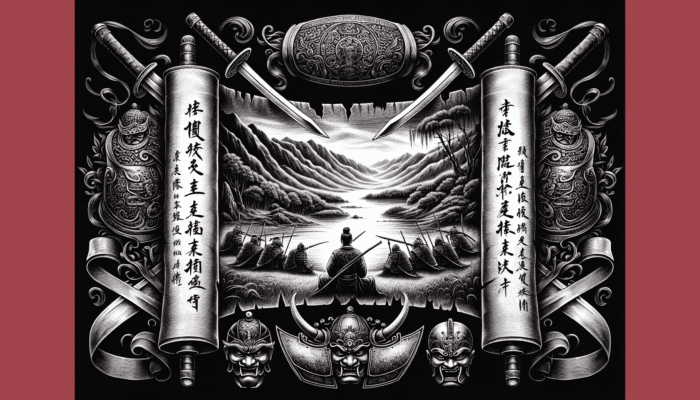This article explains how annotated versions of Sun Tzu's classic, rooted in ancient Chinese military thought, provide deeper insights. Discover how commentary enhances understanding and applies to modern business, military, and personal strategies.
Key Takeaways
- Sun Tzu's ‘The Art of War' provides key strategic principles applicable in military and modern business contexts, emphasizing preparation, intelligence, and self-awareness.
- Annotated editions of ‘The Art of War' enhance comprehension of Sun Tzu's teachings by contextualizing his strategies, making them accessible and relevant to contemporary readers.
- Key themes such as deception, adaptability, and the importance of winning without conflict inform effective leadership and strategic decision-making in today's competitive environments.
Understanding 'The Art of War': An Ancient Chinese Military Treatise Annotated

Sun Tzu’s “The Art of War” is an essential military treatise from the 5th century BC. It has been a cornerstone of the Seven Military Classics, encapsulating the essence of Chinese military thought, weapons, strategy, rank, and discipline. The treatise’s profound impact is evident in Eastern military practices, Western strategic thinking, and modern business and legal strategy. It is often referred to as Sun Tzu’s masterpiece.
The annotated editions of Sun Tzu’s work offer a treasure trove of insights, enhancing our understanding of his concise and potent aphorisms. Annotations dissect and contextualize the text, illuminating the subtleties of Sun Tzu’s strategic principles, such as the crucial role of intelligence operatives and espionage in warfare. These editions bridge the historical and cultural gaps, making the wisdom of this ancient Chinese military treatise accessible and applicable to contemporary readers.
Key Themes and Concepts in Annotations
A central theme in “The Art of War,” regarded as the most important military treatise in Asia, is the necessity of understanding both the enemy’s capabilities and one’s strengths. This comprehensive understanding creates a tactical advantage, allowing for a more effective military strategy. Annotations often emphasize the importance of knowing oneself and the adversary, turning this ancient wisdom into practical guidance for modern strategy.
The annotated edition reveals the meticulous planning and execution required in military strategy, as emphasized by Sun Tzu. These annotations help readers appreciate the depth of Sun Tzu’s insights, showing how careful planning and strategic foresight are indispensable for achieving success, whether in warfare or the competitive world of business.
Sun Tzu's Quotes Explained
Sun Tzu’s aphorisms are as sharp as they are profound. Sun Tzu's insights carry significant weight and authority as a high-ranking military general. One of his most famous quotes, “Know yourself and know your enemy, and you will never be defeated,” underscores the importance of self-awareness and intelligence in conflict. This principle is universally applicable, reminding us that understanding our strengths and weaknesses, as well as those of our adversaries, is essential for success, as taught by Master Sun.
Another pivotal quote, “Victorious warriors win first and then go to war, while defeated warriors go to war first and then seek to win,” highlights the significance of psychological preparation and strategic foresight. This concept suggests that winning psychologically before the actual battle can lead to easier victories, emphasizing the power of strategy over sheer force.
Sun Tzu also teaches that “In the midst of chaos, there is also opportunity,” indicating that strategic positioning can turn the tides of conflict. This insight is particularly relevant in today’s fast-paced world, where finding opportunities amidst uncertainty can bring significant advantages.
Best Annotated Sun Tzu 'Art of War' Book Editions by Renowned Translators
Renowned translators have played a crucial role in bringing Sun Tzu’s teachings to a global audience. British officer Everard Ferguson Calthrop attempted a partial translation into English in 1905, highlighting the significance of various translations in understanding the text's influence on military and strategic thought. Their annotated editions provide translations, insightful commentary, and footnotes that enhance readers’ understanding of the text. These annotations delve into the nuances of Sun Tzu’s strategic principles, shedding light on the art of deception and psychological tactics used to maneuver opponents.
The work of these dedicated translators emphasizes the importance of timing and adaptability, which are critical facets of Sun Tzu’s strategies. By contextualizing these ancient teachings, annotated editions reveal how Sun Tzu’s principles can be applied to modern scenarios, from military strategy to business tactics, making them invaluable resources for contemporary readers.
Practical Applications of "The Art of War" Today

Sun Tzu’s teachings extend far beyond the battlefield. Notable military and political leaders, such as Mao Zedong and General Douglas MacArthur, have drawn inspiration from The Art of War, emphasizing its profound influence on military strategy and its application beyond the battlefield into business, politics, and sports. His principles are frequently applied in industry to enhance competitive strategy and decision-making processes. For instance, timely decision-making can lead to better outcomes in both business and personal conflicts. The emphasis on self-awareness and knowledge of competitors highlights the importance of research and information in achieving success.
One key lesson from “The Art of War” is the necessity of a unique strategy. Businesses that differentiate themselves can avoid direct competition and ensure profitability. Sun Tzu also views change as an opportunity, advocating adaptability to capitalize on emerging trends. These principles are encapsulated in each chapter of the text, addressing distinct facets of warfare and offering insights applicable to various leadership contexts.
Discipline is another critical aspect emphasized by Sun Tzu. Maintaining a focused campaign, with consistent administration of rewards and punishments, fosters commitment among troops in the same spirit. Leadership insights from these editions focus on motivating teams and exemplifying effective leadership styles, which are crucial for achieving collective goals.
Modern military operations, such as Operation Desert Storm, showcase the practical application of Sun Tzu’s strategies. Deceptive tactics to confuse and defeat Iraqi forces illustrate how his principles remain relevant in contemporary warfare. Moreover, Sun Tzu’s warning against prolonged warfare, which benefits no nation, is a timeless reminder of the importance of swift and decisive action.
Chapter-by-Chapter Analysis
Annotated versions of “The Art of War” provide a detailed chapter breakdown, enhancing comprehension by offering contextual insights. This chapter-by-chapter analysis illuminates Sun Tzu's military strategies and philosophical insights, allowing readers to engage more profoundly with the text.
Each chapter offers distinct strategic insights, and annotations help to clarify these complexities. By dissecting the text, readers gain a deeper understanding of Sun Tzu's philosophies, enabling them to apply these principles more effectively in various contexts.
Preparation and Planning
Sun Tzu places immense importance on preparation and planning, asserting that thorough preparation before a conflict significantly increases the likelihood of victory. He emphasizes that success in battle stems from careful planning and understanding the environment. This principle is evident in his advice to conduct extensive calculations before engaging in conflict to ensure success.
Effective preparation also involves understanding one's strengths and the enemy's weaknesses. Sun Tzu's teachings highlight the importance of adaptability and flexibility in tactics to respond effectively to changing battlefield conditions. Leaders can ensure a disciplined and focused campaign by instilling confidence and purpose in followers.
Tactical Maneuvers
Tactical maneuvers are a cornerstone of Sun Tzu's military strategy. He stresses that tactics should vary according to circumstances, warning against the dangers of repeating successful methods without adaptation. This principle underscores the importance of flexibility and innovation in achieving victory.
One significant tactical advantage mentioned by Sun Tzu is the benefit of arriving first on the battlefield. This allows troops to prepare mentally and physically while exhausting the enemy's resources. By exploiting the enemy's weaknesses and reinforcing one's strengths, effective tactical maneuvers can turn the tide of battle in one's favor.
The Nine Situations
Chapter 11 of “The Art of War” outlines nine different scenarios or situations in warfare, each requiring unique strategies to respond effectively. This concept emphasizes the need for adaptability and strategic flexibility based on the specific circumstances encountered on the battlefield.
Sun Tzu categorizes terrain into nine types, each necessitating specific strategic responses to optimize the likelihood of success in battle. By understanding these various scenarios, leaders can better navigate the complexities of warfare and make informed decisions to achieve victory.
Supreme Excellence: Winning Without Fighting
According to Sun Tzu, supreme excellence in warfare is achieving victory without engaging in combat. This concept of winning without fighting is considered the most skilled form of success, advocating diplomatic strategies and alliance-building to resolve conflicts.
Sun Tzu suggests that a wise commander can minimize conflict by breaking the enemy's will to fight, thus achieving victory without confrontation. This principle is particularly relevant in modern contexts, where diplomatic and strategic maneuvers can lead to successful outcomes without the costs and destruction associated with prolonged conflict.
Furthermore, Sun Tzu warns against prolonged warfare, arguing that it drains resources and hinders progress. Quick resolution and strategic planning are preferred, highlighting the importance of achieving swift and decisive victories in a hundred battles.
The Role of Deception in Warfare
Deception is a fundamental principle in Sun Tzu's military strategy. He asserts that all military actions should be based on misleading the enemy, with the principle of appearing weak while strong serving as a strategic deception to deceive opponents.
Deceptive formations and tactics, such as feigned attacks and misleading military orders, can obscure a force's true strength and create opportunities for surprise attacks. These tactics support larger strategic goals and are crucial to successful military operations.
Leadership and Discipline
Sun Tzu emphasized the importance of leadership and discipline in achieving victory in warfare. He believed that a strong leader should be able to inspire and motivate their troops to fight with courage and determination. This is evident in his assertion that “regard your soldiers as your beloved sons, and they will stand by you even unto death.” This art of war patience quote underscores the deep bond and mutual respect that should exist between a leader and their followers.
Discipline is crucial in maintaining order and cohesion within the army, allowing for the effective execution of strategies and tactics. Sun Tzu's principles of leadership and discipline have been applied in military contexts and business and personal development. Effective leaders must be able to make tough decisions, adapt to changing circumstances, and maintain a clear vision for their organization. This is particularly relevant in today's fast-paced business environment, where leaders must navigate complex challenges and inspire their teams to achieve collective goals.
Sun Tzu's teachings on leadership and discipline continue to influence modern military and business strategy. They emphasize the importance of solid leadership and a disciplined approach to success. By fostering a culture of discipline and leading by example, leaders can ensure their teams are motivated, cohesive, and prepared to face any challenge.
The Role of Intelligence and Information in Warfare
Sun Tzu recognized the critical role of intelligence and information in warfare, emphasizing the importance of gathering accurate and timely information about the enemy. He believed intelligence operatives and espionage were essential in gathering information about the enemy's strengths, weaknesses, and intentions. His famous quote, “If you know the enemy and know yourself, you need not fear the result of a hundred battles.”
Sun Tzu's principles of intelligence gathering have been applied in modern military and business contexts, highlighting the importance of accurate and timely information in making informed decisions. This translates to market research, competitor analysis, and data-driven decision-making in the business world. Using intelligence and information in warfare allows for more effective strategy planning and execution, increasing the chances of success.
Sun Tzu's teachings on the role of intelligence and information in warfare continue to influence modern military and business strategy. They emphasize the importance of gathering and analyzing accurate information to gain a competitive advantage. By leveraging intelligence, leaders can anticipate the enemy's moves, exploit their weaknesses, and position themselves for victory.
Adaptability and Flexibility in Modern Times
Sun Tzu's principles of adaptability and flexibility are just as relevant in modern times as they were in ancient China. He believed that a successful military leader must be able to adapt to changing circumstances and adjust their strategy accordingly. His advice to “be extremely subtle, even to the point of formlessness, reflects this. Be extremely mysterious, even to the point of soundlessness.”
In modern business and personal development, adaptability and flexibility are essential for responding to changing market conditions, technological advancements, and shifting priorities. Sun Tzu's teachings on adaptability and flexibility emphasize the importance of pivoting and adjusting plans in response to new information or changing circumstances. Adaptability is crucial for staying ahead of the competition and achieving long-term success.
By embracing adaptability and flexibility, individuals and organizations can stay ahead of the competition and succeed in an ever-changing world. Whether adjusting business strategies to meet new market demands or pivoting personal goals in response to life changes, Sun Tzu's timeless wisdom provides a valuable framework for navigating uncertainty and achieving excellence.
The Influence of "The Art of War" on Western Military Thinking

The principles outlined in Sun Tzu's “The Art of War” have profoundly impacted Western military thinking. Analyzing annotated texts reveals the philosophical underpinnings of Sun Tzu's work, connecting military strategy to broader political concepts. This ancient Chinese military treatise has historically been applied to political survival and decision-making in Western contexts.
Historical examples, such as the Trojan Horse, illustrate how deception has been a critical strategy in military conflict. Famous military leaders, including George Washington, effectively utilized deception to mislead opponents and achieve strategic advantages. The U.S. Army, recognizing the significance of deception, has incorporated it into formal training and doctrines over the years.
Prominent Western military strategists often acknowledge Sun Tzu's concepts, particularly deception and speed, and integrate them into their doctrines. Leaders like Napoleon and Clausewitz emphasized logistics and swift victories, reflecting principles in “The Art of War.” Sun Tzu's teachings on achieving victory with minimal loss resonate with Western strategies, especially during the Cold War. His ideas about avoiding confrontation have influenced Western approaches to both warfare and diplomacy.
Summary
Sun Tzu's “The Art of War” remains a timeless guidebook for strategic thinking, applicable in various modern contexts. The annotated editions provide invaluable insights, making Sun Tzu's profound wisdom accessible and relevant to contemporary readers. Key themes such as the importance of preparation, tactical maneuvers, and the role of deception are crucial for understanding and applying these strategies.
Sun Tzu's principles of achieving victory without conflict, understanding both self and enemy and the strategic use of deception have significantly influenced Western military thinking and continue to be relevant today. By embracing these timeless strategies, individuals and organizations can navigate complex challenges and achieve success with minimal conflict. Let Sun Tzu's wisdom inspire you to apply these principles in your life, striving for supreme excellence in all your endeavors.

Frequently Asked Questions
What is the significance of annotated "The Art of War" editions?
Annotated editions of "The Art of War" significantly enhance comprehension by offering valuable commentary and footnotes, making Sun Tzu's strategic principles more accessible and relevant to contemporary readers.
How does Sun Tzu's principle of winning without fighting apply today?
Sun Tzu's principle of winning without fighting emphasizes the importance of diplomacy and strategic alliances to achieve favorable outcomes while minimizing conflict and costs. This approach remains highly applicable in contemporary business and international relations, where cooperation often leads to more effective solutions than confrontation.
Why is deception important in Sun Tzu's strategies?
Deception is crucial in Sun Tzu's strategies because it allows for the misdirection of the enemy, resulting in tactical advantages such as false attacks and misleading signals. By employing deception, one can manipulate circumstances to outmaneuver opponents effectively.
How has "The Art of War" influenced Western military thinking?
"The Art of War" significantly influenced Western military thinking by introducing principles of deception, speed, and achieving victory with minimal loss, which leaders such as George Washington and Napoleon adopted. These strategies remain relevant in military doctrines today.
What are the practical applications of "The Art of War" in business?
The principles from "The Art of War" are effectively applied in business to enhance competitive strategies, improve decision-making, and leverage timing and adaptability for differentiation and trend capitalization. Consequently, incorporating these strategies can lead to more informed and agile business practices.
How can "The Art of War" be applied to modern business strategy?
"The Art of War" offers timeless insights that are incredibly relevant to modern business strategy. Concepts like knowing your competition, strategic positioning, and leveraging strengths while exploiting competitor weaknesses can guide decision-making in today's competitive business environment. In a world where adaptability and strategic foresight are crucial, Sun Tzu's teachings remain a robust framework.
What are some examples of companies that successfully used principles from "The Art of War"?
Several companies have successfully applied Sun Tzu's principles in their strategies. For instance, Apple's dominance in the tech world is often attributed to its ability to anticipate market trends and seize opportunities before competitors. Similarly, Amazon has employed the strategy of continuous innovation to outmaneuver competitors, much like Sun Tzu's focus on adaptability and surprise.
Is "The Art of War" only relevant for large businesses, or can small businesses also benefit from it?
"The Art of War" is relevant for businesses of all sizes. Small companies often have the advantage of being more agile and adaptive, traits that Sun Tzu emphasizes. By applying asymmetric strategies, small businesses can compete against larger competitors by focusing on niches, leveraging unique strengths, and executing with precision and speed.

Ready to Apply the Annotated "The Art of War" to Your Business Strategy?
Whether you're looking to outmaneuver competitors, position your company for success, or develop long-term strategies based on timeless principles, Asymmetric Marketing can help.
Here’s how we can assist:
- Customized Strategy Sessions: Discover how to implement the insights of The Art of War in your unique business context.
- Tailored Competitive Analysis: We’ll help you assess your competitive landscape and identify opportunities to apply asymmetric strategies.
- Expert Guidance: Let us show you how to integrate strategic principles into your marketing, operations, and leadership.
Take Action Now
📧 Contact us today through our Contact Form
📅 Schedule a complimentary consultation here
🚀 Unlock your strategic advantage by subscribing to our newsletter for regular business strategy and growth insights.
About the author
Mark A. Hope is the co-founder and Partner at Asymmetric Marketing, an innovative agency dedicated to creating high-performance sales and marketing systems, campaigns, processes, and strategies tailored for small businesses. With extensive experience spanning various industries, Asymmetric Marketing excels in delivering customized solutions that drive growth and success. If you’re looking to implement the strategies discussed in this article or need expert guidance on enhancing your marketing efforts, Mark is here to help. Contact him at 608-410-4450 or via email at mark.hope@asymmetric.pro.

